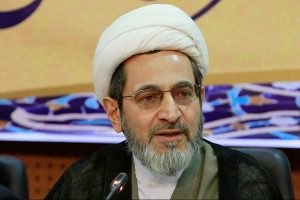Born in 1953, Masjed-Jamei is a religion scholar and researcher, with a special focus on Christianity. A former ambassador of the Islamic Republic of Iran to Vatican and Morocco, Masjed-Jamei has authored several books including “Christians and the New Era”, which deals with the geopolitics of modern Christianity in the contemporary era.

A PhD graduate in geopolitics from the University of Pisa in Italy, Masjed-Jamei has taught at the University of Religions and Denominations of Qom as well as the Iranian Foreign Ministry’s School of International Relations.
In a detailed interview with Iranian news website Khabar Online, Masjed-Jamei has weighed on the impact of evangelical Christianity on the US politics and the country’s foreign policy, especially since President Donald Trump assumed office.
An English version of the interview, originally conducted in Persian, is published by IFP News in several parts.
The first part mainly focused on the impact of evangelical Christianity on Trump’s relations with Iran.
What follows is the second part of the interview, which mainly concerns the US government’s use of religion to prop up its regional ally Israel:
Trump himself is not that evangelical, i.e., his religious beliefs are not much deep-rooted compared to those of Mike Pompeo, Mike Pence and the like. However, his associates are deeply evangelical; most importantly, Trump has pinned his hopes on these evangelicals in order to boost his popularity among Americans, especially for the upcoming elections. So, the issue of evangelicals is very important and even vital to him. The key reason why he picked Pence as Vice President was to attract evangelicals.
I should also add that the United States’ current policy, regardless of us and our region, especially toward Latin America, has a religious side to it. That means – as was the case at the time of Reagan – they are trying hard to turn Latin America into their own favourite churches, i.e., evangelical churches. Of course, that does not mean that they only promote evangelicalism there; rather, they try to elevate evangelical groups to better political, social and economic positions. An example of that is Brazil whose presidents usually had socialist-democratic tendencies following the rule of juntas. This is the first time that a right-leaning person like Jair Bolsonaro comes to power. He is a devout evangelical, too and he emerged victorious with the help of the US while his rival, Haddad, was in a better position. You see the same trend in Guatemala whose president Jimmy Morales came to power with Washington’s help as well.
But Bolsonaro is a Catholic!
I know, but he is a “born-again” Catholic and an “evangelicalized” one. His supporters are evangelical, too. Even Trump’s Secretary of State Mike Pompeo is a Catholic, but one who is aligned with evangelicals, not with the Catholic Church in Rome. Their Catholicism is a strange combination. US Vice President Mike Pence is like that, too.
Anyway, irrespective of our region and Iran, the United States’ foreign policy vis-à-vis the whole world is an amalgamation of nationalism and US-style rightist extremism. And when it comes to Latin America, the element of religion is somehow added to it. However, the issue of religion is not that determining with regard to a country like China which, the US feels, is a tough rival and is becoming all the more powerful; rather, the nationalistic and rightist dimensions of the policy have the most influence.
And as for our region, especially the occupied territories, i.e., Israel, this policy is a completely religion-driven one. That means the Americans want to use religious motives to serve the interests of Israel and not only strengthen the Tel Aviv regime, but also meet its various needs. This tendency has two reasons: first, based on the religious book, they believe they will be successful and have welfare and be masters only if they serve Israel. In their viewpoint, the United States’ prosperity and grandeur and dignity is subject to honestly serving Israel. They really have such a picture in mind.
Recently, I watched a video where an American shepherd, while blindfolded and standing in front of the crowd at the church apparently worshipping the Lord, was asking God to protect the United States against the coronavirus because the US had treated Israel well.
Yes, that’s the case. On the other hand, they believe world Jews having assembled at the so-called “Israeli land” and the construction of the Jewish “Third Temple” are preludes to the reappearance of Jesus Christ. At the moment, a key feature of the evangelical ideology is the issue of the apocalypse and the re-emergence of Jesus Christ. To them, this is not a simple belief, but a fundamental one which is very provocative and promising.
US Ambassador to Israel David Friedman, who happens to be a Jew, is such an ardent supporter of Israel that one cannot tell whether he is really the “US ambassador” to Israel or the “Israeli ambassador” to the United States. A few days after the opening of the US Embassy in Beit-ul-Muqaddas in 2018, he was seen in a picture which showed him standing in one of occupied Palestinian cities. That picture had been photoshopped to replace Temple Mount with the “Third Temple.” As you know, he is not an ordinary person to be authorized to do such things; he is a political authority.
Religion-wise, they are generally very sensitive about that land and Jews, and that’s why the religious dimension of their foreign policy plays the main role when dealing with Iran. Their policy toward Israel, and toward the entire Middle East for that matter, is that Israel should be prominent in the region, and that relations within the region should take shape in such a way that Israel’s interests are served. They are seriously pursuing these objectives and try to manage the Middle East as well as political and economic relations and energy routes within the region in such a way that Israel will benefit most from it. Even their policy vis-à-vis North Africa is such that it would serve Israel’s interests as much as possible. Well, I’m not going to give examples here.
The third part of the interview will be released in coming days.
